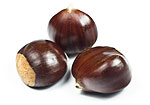 Varicose veins are a common and unsightly — and often painful — problem for many adults. But there have been many health breakthroughs in the area, and many herbal remedies and natural medicine options are available. Here are your top eight.
Varicose veins are a common and unsightly — and often painful — problem for many adults. But there have been many health breakthroughs in the area, and many herbal remedies and natural medicine options are available. Here are your top eight.
1. Horse Chestnut
Containing the active ingredient saponin, horse chestnut could boost circulation in your veins and reduce varicose symptoms. The herb helps reinforce veins by helping your body repairs leaks or holes in the blood vessels. This, in turn, makes them more elastic, which improves blood flow to the heart.
One review of studies found that extract from horse chestnut is just as effective as the best medication for varicose veins. A dozen other studies back this up, all finding the herb to significantly reduce swelling, pain and heaviness in the leg.
2. Gotu Kola
This famous herb heads straight to your problem veins and begins to repair them. Its anti-inflammatory properties could reduce swelling. There have been many studies on this link, and a literature review last decade helped put a stamp on it all. Researchers found that gotu kola improved all symptoms, including swelling in the feet and ankles, and fluid leakage from veins. An earlier study used 60 or 120 mg a day for two months on 94 patients. The results: the patients had a significant improvement in symptoms compared to placebo, especially heaviness in the legs and swelling.
RECOMMENDED: More Uses for Gotu Kola
3. Grape Leaf
This herb can lessen pain and treat the veins. A study this decade found that doses ranging from 360 mg to 720 mg worked over a three-month span. The only side effects were upset stomach and the occasional headache.
4. OPCs
About seven studies have found that oligomeric proanthocyanidin complexes (OPCs) could help treat varicose veins. They can strengthen tissue, reduce fluid leakage, and prevent inflammation. They are now common supplements on their own, and also found within grape seed and pine bark.
5. Pycnogenol
This is a type of pine bark, and one study found that it significantly reduced heaviness in the legs and swelling. Researchers there used 100 mg twice or three times a day for two months on 40 patients. Other studies have backed this up.
6. Laser Therapy
Your best alternative therapy option, laser treatment, is well-known for improving the condition. A recent study highlighted this ability, using laser therapy to treat over 400 varicose veins in over 300 patients. The success rate was 88% after three years. Researchers found that it effectively controlled the veins, causing them to fade away.
7. Butcher’s Broom
One study found that the natural chemical ruscogenine in butcher’s broom, an evergreen shrub, led to significant improvements in symptoms over 12 weeks. As for butcher’s broom itself, the typical dose is 150 mg, three times a day. It may be more effective when taken with vitamin C.
8. Mesoglycan
One study used 30 mg or 100 mg a day for 24 weeks. Mesoglycan, an alternative medicine based on a naturally occurring substance used by the body to build connective tissues, led to significantly faster healing of ulcers.
As usual, always check with your doctor before trying any new supplement to see if it might interact with a medication that you’re taking and to see if it might have any side effects.
Sources:
Pittler, M.H., and Ernst, E., “Horse-chestnut seed extract
for chronic venous insufficiency. A criteria-based
systematic review,” Arch. Dermatol., 1998; 134: 1,356-
1,360.
Cesarone, M.R., et al., “Activity of Centella asiatica in
venous insufficiency,” Minerva Cardioangiol., 1992; 40:
137-143.
Pointel, J.P., et al., “Titrated extract of Centella asiatica
(TECA) in the treatment of venous insufficiency of the
lower limbs,” Angiology, 1987; 38: 46-50.
Unkauf, M., et al., “Investigation of the efficacy of
oxerutins compared to placebo in patients with chronic
venous insufficiency treated with compression stockings,”
Arzneimittelforschung., 1996; 46: 478-482.
Kiesewetter, H., et al., “Efficacy of orally administered
extract of red vine leaf AS 195 (folia vitis viniferae) in
chronic venous insufficiency (stages I–II),”
Arzneimittelforschung., 2000; 50: 109-117.
Petrassi, C., et al., “Pycnogenol in chronic venous
insufficiency,” Phytomedicine, 2000; 7: 383-388.
Myers, K., et al., “Treatment of varicose veins by
endovenous laser therapy: assessment of results by
ultrasound surveillance,” Med. J. Aust., Aug. 21, 2006;
185(4): 199-202.
Vanscheidt, W., et al., “Efficacy and safety of a Butcher’s
broom preparation (Ruscus aculeatus L. extract) compared
to placebo in patients suffering from chronic venous
insufficiency,” Arzneimittel forschung, 2002; 52: 243-50.
Arosio, E., et al., “A placebo-controlled, double-blind study
of mesoglycan in the treatment of chronic venous ulcers,”
European Journal Vascular Endovascular Surgery, 2001;
22: 365-372.
